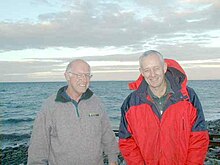Don Merton
|
Don Merton QSM |
|
|---|---|

Merton (left) with Dave Barker on Hauturu (Little Barrier Island)
|
|
| Born |
Donald Vincent Merton 22 February 1939 Auckland, New Zealand |
| Died | 10 April 2011 (aged 72) Auckland, New Zealand |
| Nationality | New Zealander |
| Occupation | Conservationist |
| Home town | Tauranga, New Zealand |
Donald Vincent "Don" Merton, QSM (22 February 1939 – 10 April 2011), was a New Zealand conservationist best known for saving the black robin from extinction. He also discovered the lek breeding system of the kakapo.
Until his retirement in April 2005, Merton was a senior member of the New Zealand Department of Conservation’s Threatened Species Section, within the Research, Development & Improvement Division, Terrestrial Conservation Unit, and of the Kakapo Management Group. He has had a long involvement in wildlife conservation, specialised in the management of endangered species since he completed a traineeship with the New Zealand Wildlife Service (NZWS) in 1960.
Merton was born in Devonport, Auckland in February 1939 and with his family moved to Gisborne later that year when his father, Glaisher (Major) Merton was appointed the first New Zealand Automobile Association representative in the Poverty Bay region. Initially, the family settled at Wainui Beach near Gisborne, but in 1945 moved to a farmlet in Mangapapa Road, Gisborne.
Together with his two older brothers, Merton had early success fostering an orphaned wild goldfinch nestling to their grandmother's canary. This early success proved crucial 35 years later in inspiring a cross-fostering programme to save the black robin, which at that time numbered five individuals including just one productive pair, and was the most endangered species in the world.
Merton attended schools at Kaiti, Mangapapa, Gisborne Intermediate and Gisborne High School. On leaving school he secured a traineeship with the fledgling New Zealand Wildlife Service. In 1987 the Wildlife Service merged with other Government conservation agencies to form the Department of Conservation. In the early 1960s Merton became one of only two field officers working nationally on threatened species, roles now filled by more than 80 staff.
...
Wikipedia
